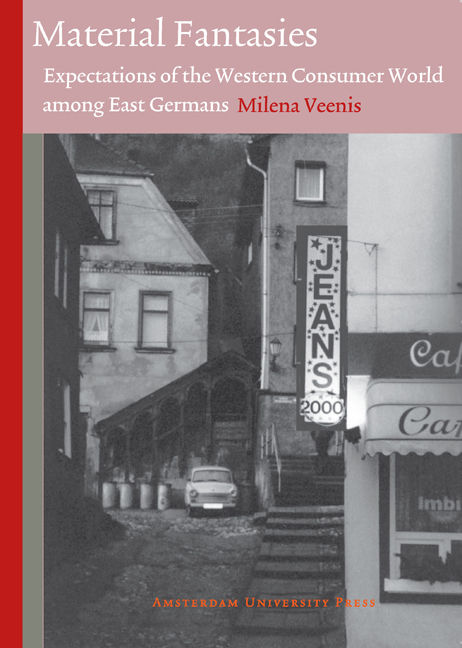Book contents
- Frontmatter
- Preface
- Contents
- Introduction
- Chapter 1 Fieldwork
- Chapter 2 Germany 1945: A Country in Ruins
- Chapter 3 The GDR: Future Promises
- Chapter 4 Material Realizations
- Chapter 5 The East German Dictatorship
- Chapter 6 Silenced Pasts
- Chapter 7 Western Promise
- Chapter 8 Shattered Illusions
- Conclusion
- Notes
- Bibliography
- Index
- Foundation for the History of Technology & Amsterdam University Press Technology and European History Series Ruth Oldenziel and Johan Schot (Eindhoven University of Technology): Series Editors
Chapter 8 - Shattered Illusions
Published online by Cambridge University Press: 15 January 2021
- Frontmatter
- Preface
- Contents
- Introduction
- Chapter 1 Fieldwork
- Chapter 2 Germany 1945: A Country in Ruins
- Chapter 3 The GDR: Future Promises
- Chapter 4 Material Realizations
- Chapter 5 The East German Dictatorship
- Chapter 6 Silenced Pasts
- Chapter 7 Western Promise
- Chapter 8 Shattered Illusions
- Conclusion
- Notes
- Bibliography
- Index
- Foundation for the History of Technology & Amsterdam University Press Technology and European History Series Ruth Oldenziel and Johan Schot (Eindhoven University of Technology): Series Editors
Summary
Where we think we have caught hold of the Grail, we have only grasped a thing, and what is left in our hands is only a cooking pot (Georges Bataille, 1988 [1967]).
In late 1989, the unimaginable happened: GDR residents could freely enter West Germany, and one year later, the two Germanys were united. In that year, the country was in a state of jubilation. The euphoria was immense, especially in the GDR. Yet these joyous feelings quickly disappeared, and five years later they had given way to a general mood of dissatisfaction, disappointment, frustration and despair. Many felt like the man in the street, cheated by the western world. Many missed the GDR, sighing nostalgically: “Then the world was still friendly, warm and convenient.” Interestingly, this mood was apparent in every social circle and layer of society. Even people who had prospered since the Wende often declared their frustration and disappointment. All in all, I hardly met anyone who was entirely satisfied with the changes that had taken place. The question is how this mood change should be interpreted?
There appeared to be various reasons for the widespread discontent. In the first place, many East Germans were disappointed by what the economic upheaval had engendered. In a market economy, only the fittest survive according to East German common opinion. This was seen as one of the causes not only of the high unemployment in the GDR, but of the painful fact that, in order to better themselves, people cheated on each other. The second reason why the capitalist world met with such strong disapproval in the former GDR was that since the Wende, social differentiation between people had increased considerably. This was said to have largely put an end to people's involvement with each other. The third reason was that the relationship between East and West Germans did not work out as people had expected. On the contrary, because West Germans supposedly looked down on East Germans and their past society, East Germans collectively felt as if they had become second-class citizens in their own country. The changes in the consumer market that had occurred since the Wende were cited as a cause, a result or an illustration of the three different sources of discontent.
- Type
- Chapter
- Information
- Material FantasiesExpectations of the Western Consumer World among East Germans, pp. 183 - 214Publisher: Amsterdam University PressPrint publication year: 2012



